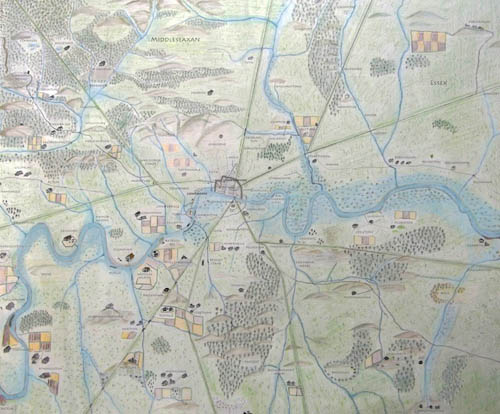Use the ARCHI Place-Name Finder Search Form below to search for archaeologically significant placenames and place-name elements (eg *ton, *chester*) and generate a distribution map of all places in Britain which have that name or element.
English place names can be broken down into different components, each of which has its own meaning and significance. Understanding these components can help us understand the origins and history of a place name.
- Prefixes: Many English place names begin with a prefix, which often indicates the type of settlement or location. For example, "Borough" indicates a fortified town or settlement, "Ham" refers to a settlement surrounded by an enclosure or hemmed in by a river, and "Cot" refers to a small dwelling or cottage.
- Root words: The root word of a place name can give us a clue about the landscape, geography, or history of the area. For example, "Chester" comes from the Latin word "castra," meaning camp or fortress, and indicates that a Roman fort or military camp once existed in the area. "Ton" comes from the Old English word for "enclosure" or "settlement," indicating that the place was once a small, enclosed community.
- Suffixes: Suffixes can also provide important information about the place. For example, "ford" indicates a place where a river can be crossed, "stead" means a farm or homestead, and "bridge" refers to a place where a bridge was built.
- Personal names: Some place names are named after a person or family, such as "Birmingham" (the home of the Beormingas) or "Hastings" (named after the Norman conqueror William the Conqueror's half-brother, Robert FitzRoy, Count of Mortain, who was also known as Robert de Hastings).
- Descriptive names: Finally, some place names simply describe the landscape or geography of the area. For example, "Green Hill" or "High Peak" are descriptive names that tell us about the physical features of the area.
 What's in a 'British' Place-name?
What's in a 'British' Place-name?
British place-names (actually most worldwide place names), are usually constructed from two or more elements see (List of English place-name meanings). One element might be an old personal name (eg Balham, (Baela's Homestead), while the others might refer to a local geographic feature or to an early function of the place (eg Chipping Norton, Market North Town). Place-names are often used in archaeology and history as clues to locate sites of archaeological and historic interest and are also helpful in understanding the development of the English Language.
Place-names, Genealogy and Family History
Regarding place-name genealogy and family history studies, approximately 30% of modern British surnames / family names are derived from place-names. These are known as toponymic / topographic surnames and may, in some cases, refer to a family's place of origin.
Use the search form above to if your surname matches to a British Place-name. It may help see where your ancestors might have come from.
 Archaeologically Significant Place-names
Archaeologically Significant Place-names
 Surnames / Family Names
Surnames / Family Names
 Place-names and the Development of the English Language
Place-names and the Development of the English Language
 Types of Search Available
Types of Search Available
